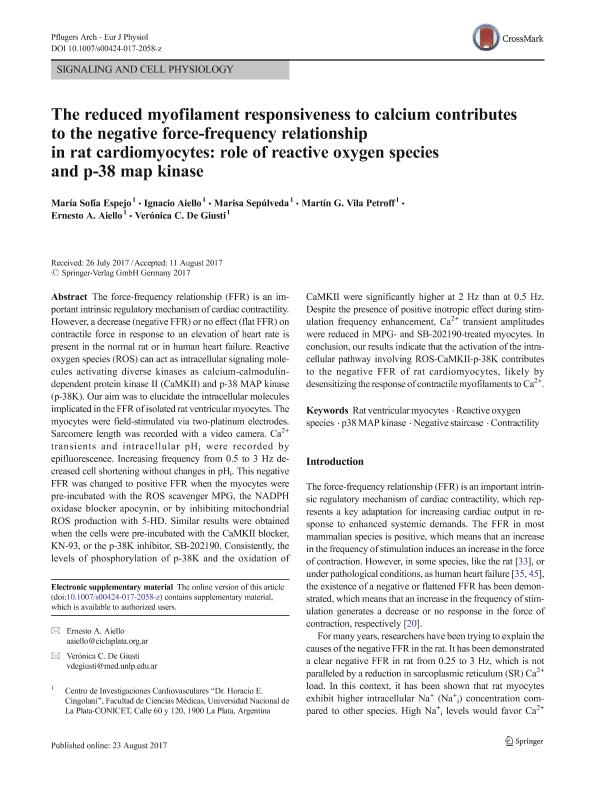Artículo
The reduced myofilament responsiveness to calcium contributes to the negative force-frequency relationship in rat cardiomyocytes: role of reactive oxygen species and p-38 map kinase
Espejo, María Sofía ; Aiello, Ignacio
; Aiello, Ignacio ; Sepúlveda, Marisa Noemí
; Sepúlveda, Marisa Noemí ; Vila Petroff, Martin Gerarde
; Vila Petroff, Martin Gerarde ; Aiello, Ernesto Alejandro
; Aiello, Ernesto Alejandro ; de Giusti, Verónica Celeste
; de Giusti, Verónica Celeste
 ; Aiello, Ignacio
; Aiello, Ignacio ; Sepúlveda, Marisa Noemí
; Sepúlveda, Marisa Noemí ; Vila Petroff, Martin Gerarde
; Vila Petroff, Martin Gerarde ; Aiello, Ernesto Alejandro
; Aiello, Ernesto Alejandro ; de Giusti, Verónica Celeste
; de Giusti, Verónica Celeste
Fecha de publicación:
12/2017
Editorial:
Springer
Revista:
Pflugers Archiv-European Journal of Physiology
ISSN:
0031-6768
e-ISSN:
1432-2013
Idioma:
Inglés
Tipo de recurso:
Artículo publicado
Clasificación temática:
Resumen
The force-frequency relationship (FFR) is an important intrinsic regulatory mechanism of cardiac contractility. However, a decrease (negative FFR) or no effect (flat FFR) on contractile force in response to an elevation of heart rate is present in the normal rat or in human heart failure. Reactive oxygen species (ROS) can act as intracellular signaling molecules activating diverse kinases as calcium-calmodulin-dependent protein kinase II (CaMKII) and p-38 MAP kinase (p-38K). Our aim was to elucidate the intracellular molecules implicated in the FFR of isolated rat ventricular myocytes. The myocytes were field-stimulated via two-platinum electrodes. Sarcomere length was recorded with a video camera. Ca2+ transients and intracellular pHi were recorded by epifluorescence. Increasing frequency from 0.5 to 3 Hz decreased cell shortening without changes in pHi. This negative FFR was changed to positive FFR when the myocytes were pre-incubated with the ROS scavenger MPG, the NADPH oxidase blocker apocynin, or by inhibiting mitochondrial ROS production with 5-HD. Similar results were obtained when the cells were pre-incubated with the CaMKII blocker, KN-93, or the p-38K inhibitor, SB-202190. Consistently, the levels of phosphorylation of p-38K and the oxidation of CaMKII were significantly higher at 2 Hz than at 0.5 Hz. Despite the presence of positive inotropic effect during stimulation frequency enhancement, Ca2+ transient amplitudes were reduced in MPG- and SB-202190-treated myocytes. In conclusion, our results indicate that the activation of the intracellular pathway involving ROS-CaMKII-p-38K contributes to the negative FFR of rat cardiomyocytes, likely by desensitizing the response of contractile myofilaments to Ca2+.
Archivos asociados
Licencia
Identificadores
Colecciones
Articulos(CIC)
Articulos de CENTRO DE INVEST.CARDIOVASCULARES (I)
Articulos de CENTRO DE INVEST.CARDIOVASCULARES (I)
Citación
Espejo, María Sofía; Aiello, Ignacio; Sepúlveda, Marisa Noemí; Vila Petroff, Martin Gerarde; Aiello, Ernesto Alejandro; et al.; The reduced myofilament responsiveness to calcium contributes to the negative force-frequency relationship in rat cardiomyocytes: role of reactive oxygen species and p-38 map kinase; Springer; Pflugers Archiv-European Journal of Physiology; 469; 12; 12-2017; 1663-1673
Compartir
Altmétricas



